Unit 1 How can we become good learners? Section B (2a-2e) 课件(共31张PPT)
文档属性
| 名称 | Unit 1 How can we become good learners? Section B (2a-2e) 课件(共31张PPT) | 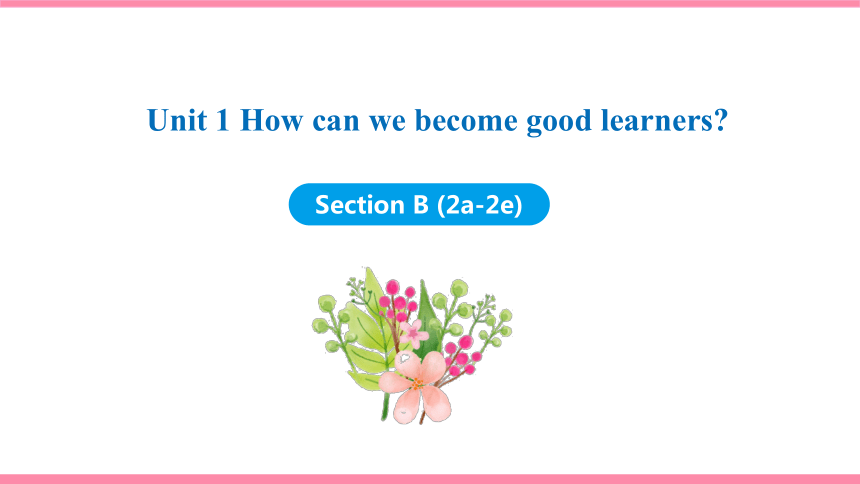 | |
| 格式 | zip | ||
| 文件大小 | 13.7MB | ||
| 资源类型 | 教案 | ||
| 版本资源 | 人教新目标(Go for it)版 | ||
| 科目 | 英语 | ||
| 更新时间 | 2021-09-02 14:02:52 | ||
图片预览


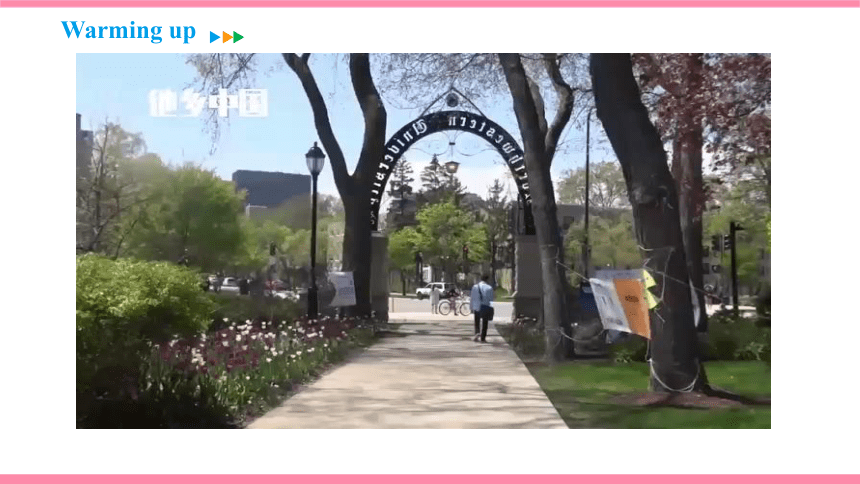
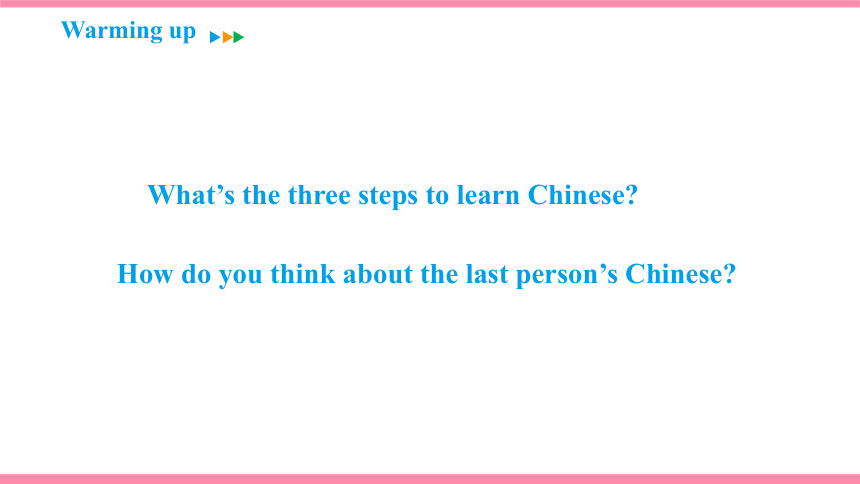
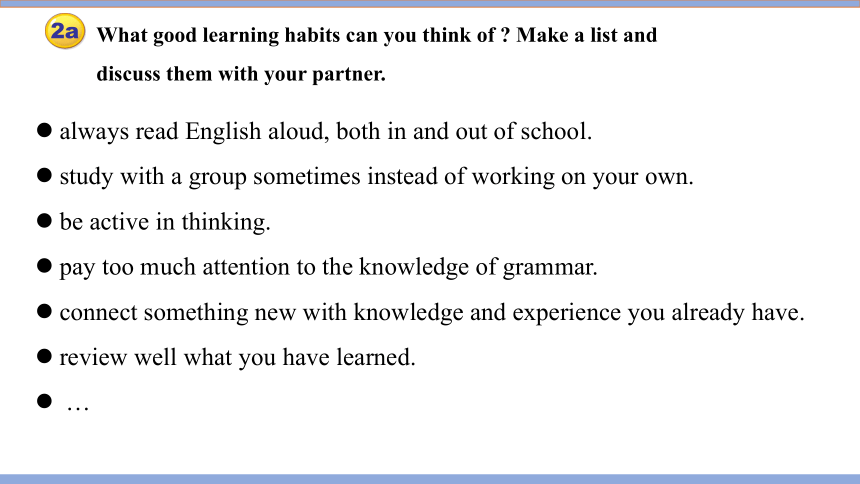
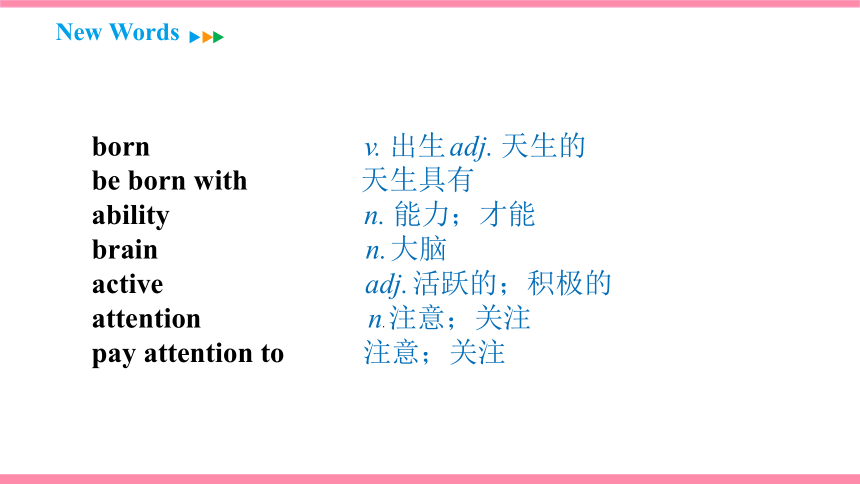
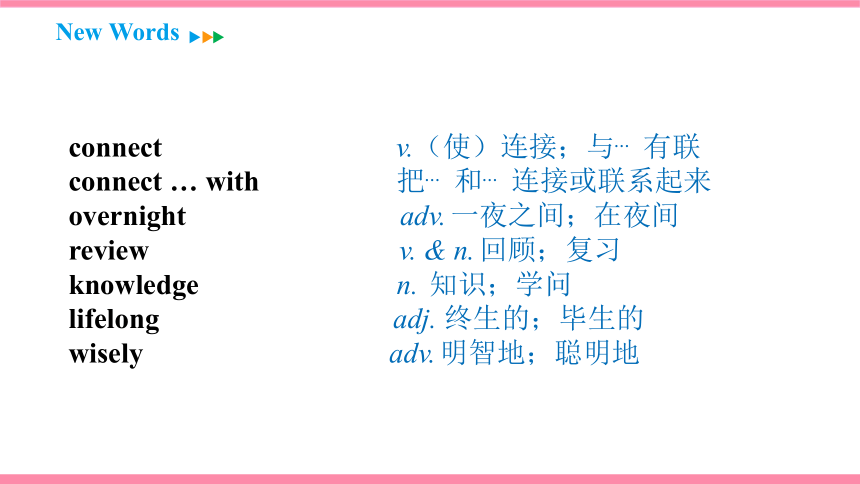
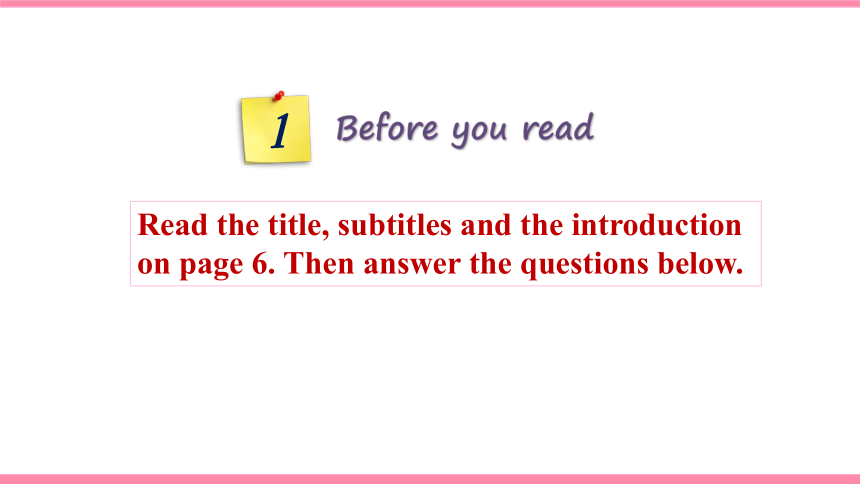
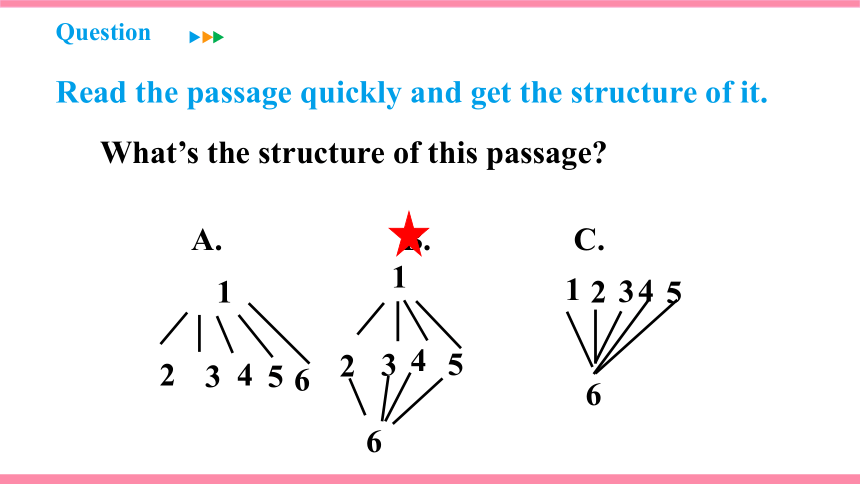
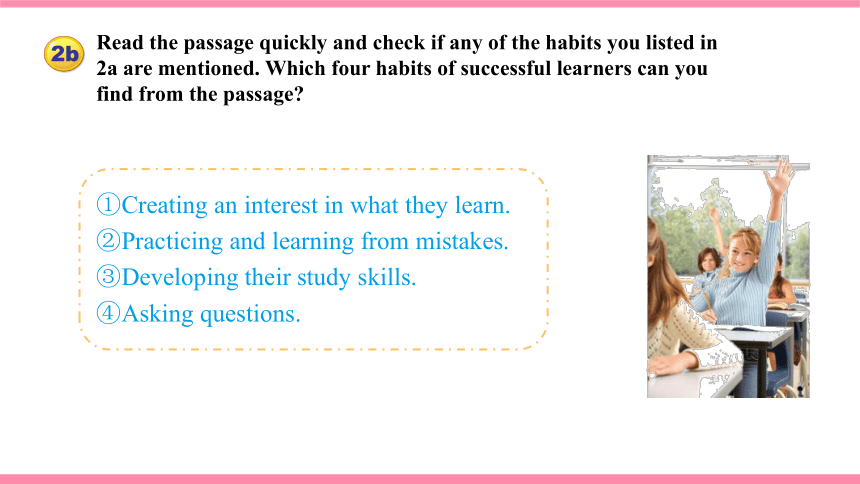
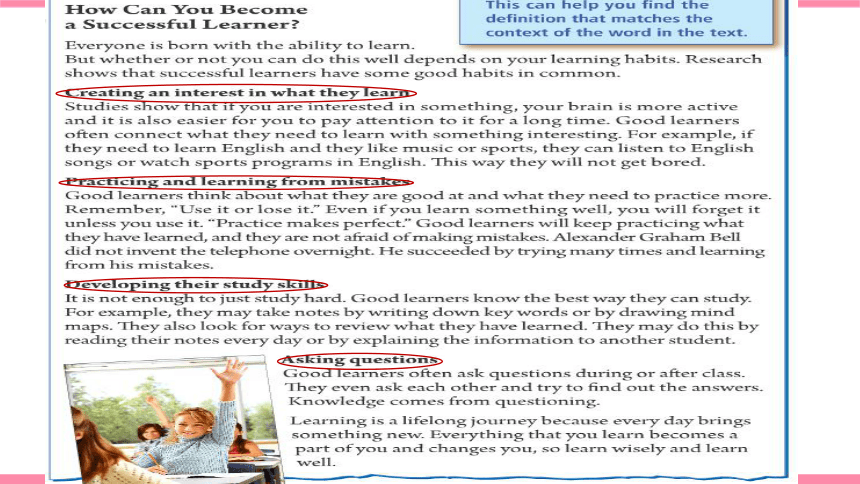
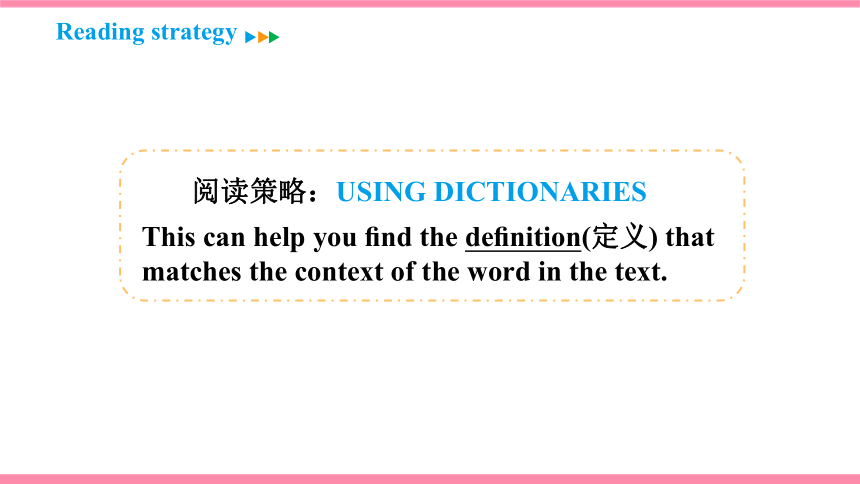
文档简介
(共31张PPT)
Unit
1
How
can
we
become
good
learners?
人教九年级上册
Unit
1
Section
B
(2a-2e)
Have
you
ever
seen
foreigners
learn
Chinese?
Warming
up
Let’s
watch
a
video!
Warming
up
Warming
up
What’s
the
three
steps
to
learn
Chinese?
How
do
you
think
about
the
last
person’s
Chinese?
What
good
learning
habits
can
you
think
of
?
Make
a
list
and
discuss
them
with
your
partner.
2a
always
read
English
aloud,
both
in
and
out
of
school.
study
with
a
group
sometimes
instead
of
working
on
your
own.
be
active
in
thinking.
pay
too
much
attention
to
the
knowledge
of
grammar.
connect
something
new
with
knowledge
and
experience
you
already
have.
review
well
what
you
have
learned.
…
New
Words
born
v.
出生
adj.
天生的
be
born
with
天生具有
ability
n.
能力;才能
brain
n.
大脑
active
adj.
活跃的;积极的
attention
n.
注意;关注
pay
attention
to
注意;关注
New
Words
connect
v.(使)连接;与?有联
connect
…
with
把?和?连接或联系起来
overnight
adv.
一夜之间;在夜间
review
v.
&
n.
回顾;复习
knowledge
n.
知识;学问
lifelong
adj.
终生的;毕生的
wisely
adv.
明智地;聪明地
Before
you
read
1
Read
the
title,
subtitles
and
the
introduction
on
page
6.
Then
answer
the
questions
below.
What’s
the
structure
of
this
passage?
A.
4
2
3
1
5
B.
C.
1
3
2
1
2
5
4
3
4
5
6
6
6
Read
the
passage
quickly
and
get
the
structure
of
it.
Question
Read
the
passage
quickly
and
check
if
any
of
the
habits
you
listed
in
2a
are
mentioned.
Which
four
habits
of
successful
learners
can
you
find
from
the
passage?
2b
①Creating
an
interest
in
what
they
learn.
②Practicing
and
learning
from
mistakes.
③Developing
their
study
skills.
④Asking
questions.
阅读策略:USING
DICTIONARIES
This
can
help
you
?nd
the
de?nition(定义)
that
matches
the
context
of
the
word
in
the
text.
Reading
strategy
While
you
read
Read
subtitles,
the
first
sentence
and
the
last
sentence
of
each
paragraph,
then
complete
the
table.
2
habits
proofs
Creating
an
interesting
in
what
they
learn
Practicing
and
learning
from
mistakes
Developing
their
study
skills
Asking
questions
If
you’re
interested
in
sth.,
your
brain
is
more
active
and
it
is
also
easier
for
you
to
pay
attention
to
it
for
a
long
time.
Use
it
or
lose
it.
It
is
not
enough
to
just
study
hard.
Knowledge
comes
from
questioning.
3
After
you
read
Read
the
second
paragraph,
fill
in
the
blanks
.
habits
How
good
learners
do?
proofs
examples
Your
brain
is
more
active;
It
is
easier
for
you
to
pay
attention
to
it
for
a
long
time.
Creating
an
interesting
in
what
they
learn
Good
learners
often
connect
what
they
need
to
learn
with
something
interesting.
They
can
listen
to
English
songs
or
watch
sports
programs
in
English.
Everyone
is
born
with
the
ability
to
learn.
But
whether
or
not
you
can
do
this
well
depends
on
your
learning
habits.
Research
shows
that
successful
learners
have
some
good
habits
in
common.
Creating
an
interest
in
what
they
learn
Studies
show
that
if
you
are
interested
in
something,
your
brain
is
more
active
and
it
is
also
easier
for
you
to
pay
attention
to
it
for
a
long
time.
Good
learners
often
connect
what
they
need
to
learn
with
something
interesting.
For
example,
if
they
need
to
learn
English
and
they
like
music
or
sports,
they
can
listen
to
English
songs
or
watch
sports
programs
in
English.
This
way
they
will
not
get
bored.
How
Can
You
Become
a
Successful
Learner?
Passage
Practicing
and
learning
from
mistakes
Good
learners
think
about
what
they
are
good
at
and
what
they
need
to
practice
more.
Remember,
“Use
it
or
lose
it.”
Even
if
you
learn
something
well,
you
will
forget
it
unless
you
use
it.
“Practice
makes
perfect.”
Good
learners
will
keep
practicing
what
they
have
learned,
and
they
are
also
not
afraid
of
making
mistakes.
Alexander
Graham
Bell
did
not
invent
the
telephone
overnight.
He
succeeded
by
trying
many
times
and
learning
from
his
mistakes.
Developing
their
study
skills
It
is
not
enough
to
just
study
hard.
Good
learners
know
the
best
way
they
can
study.
For
example,
they
may
take
notes
by
writing
down
key
words
or
by
drawing
mind
maps.
They
also
look
for
ways
to
review
what
they
have
learned.
They
may
do
this
by
reading
their
notes
every
day
or
by
explaining
the
information
to
another
student.
Passage
Asking
questions
Good
learners
often
ask
questions
during
or
after
class.
They
even
ask
each
other
and
try
to
find
out
the
answers.
Knowledge
comes
from
questioning.
Learning
is
a
lifelong
journey
because
every
day
brings
something
new.
Everything
that
you
learn
becomes
a
part
of
you
and
changes
you,
so
learn
wisely
and
learn
well.
Passage
1.
Everyone
is
born
with
the
ability
to
learn.
But
whether
or
not
you
can
do
this
well
depends
on
your
learning
habits.
Grammar
whether
or
not
意为“是”
whether引导主语从句,不能与if
替换。
Depend
on
意为“
视……而定,取决于;依靠;依赖
。后接名词,代词或动名词。既不能用于进行时态也不能用于被动语态。
Whether
she
will
come
or
not
is
still
a
problem.
她是否会来还是个问题。
We
depend
on
the
newspaper
for
daily
news.
我们得靠报纸得知每天的消息。
Grammar
Please
don’t
connect
this
lesson
with
that
person.
请不要把这个人和那个人联系在一起。
2.
Good
learners
often
connect
what
they
need
to
learn
with
something
they
are
interested
in.
connect…with…意为“
把……和……联系起来”
,其中connect为及物动词,意为“(使)连接;与…有联系”,其名词形式为connection,意为“连接;关系”。
Grammar
Whether
you
did
it
right
or
wrong
isn’t
so
important.
What’s
important
is
the
experience
you
gained.
3.
But
whether
or
not
you
can
do
this
well
depends
on
your
learning
habits.
此句中whether
or
not
you
can
do
this
well是个从句,用作整个句子的主语。这种从句叫作“主语从句”。
2c
Read
the
passage
again
and
answer
the
questions.
Does
the
writer
think
that
everyone
is
born
with
the
ability
to
learn
well?
Do
you
agree?
Why
or
why
not?
No.
No,
I
don’t.
Because
whether
or
not
you
can
learn
well
depends
on
your
learning
habits.
Because
if
you
are
interested
something,
your
brain
is
more
active
and
it
is
also
easier
for
you
to
pay
attention
to
it
for
a
long
time.
2.
Why
is
it
a
good
idea
to
connect
something
you
need
to
learn
with
something
you
are
interested
in?
2c
Read
the
passage
again
and
answer
the
questions.
3.
What
do
the
sayings
“Use
it
or
lose
it”
and
“Practice
makes
perfect”
mean?
Do
you
agree
with
them?
4.
Do
good
learners
learn
from
mistakes
or
are
they
afraid
of
making
mistakes?
Good
learners
learn
from
mistakes.
Use
it
or
lose
it:
If
you
stop
doing
something,
you
will
forget
how
to
do
it.
Practice
makes
perfect:
If
you
do
something
again
and
again,
you
will
become
very
good
at
it.(Answers
will
vary
for
the
second
part
of
the
question.)
2C
Read
the
passage
again
and
answer
the
questions.
6.
Do
you
agree
that
learning
is
a
lifelong
journey?
Why
or
why
not?
5.
What
study
skills
does
the
writer
talk
about?
Do
you
have
those
study
skills?
Creating
an
interest
in
what
you
learn,
practicing
and
leaning
from
mistakes,
developing
study
skills
and
asking
questions.
Yes,
I
do.
Because
every
day
brings
something
new.
Yes,
I
do./
No,
I
don’t.
...
Look
up
the
following
words
from
the
passage
in
the
dictionary.
Then
write
a
sentence
for
each
word.
brain
n.
connect
v.
overnight
adv.
attention
n.
review
v.
knowledge
n.
ability
n.
active
adj.
wisely
adv.
e.g.
brain:
A
good
way
to
train
the
brain
is
to
do
some
math
exercises
every
day.
2d
connect:
This
railway
line
connects
Beijing
and
Guangzhou.
overnight:
The
actor
became
famous
overnight.
attention:
We
must
pay
attention
to
our
pronunciation.
review:
We
should
review
the
lessons
in
time.
knowledge:
Knowledge
comes
from
questioning.
...
Do
you
think
you
are
a
good
learner?
What
learning
habits
do
you
think
are
useful?
Discuss
with
your
group
and
share
your
ideas
with
the
class.
A:
I
think
I
am
a
good
learner.
The
useful
learning
habit
is
trying
to
think
about
the
same
thing
in
different
ways.
B:
I
agree.
It’s
important
to...
2e
Exercises
一、根据汉语写出英文翻译
1.
注意,关注
2.
把…和…联系起来
3.
天生具有…
4.
取决于
5.
即使
6.
害怕
7.
犯错误
8.
向…学习
9.
熟能生巧
pay
attention
to
connect…with…
be
born
with…
depend
on
even
if
be
afraid
of
make
mistakes
learn
from
Practice
makes
perfect
Exercises
二.单项填空
1.
The
teacher
speaks
_____
quickly
____
we
can’t
follow
him.
A.
such,
that
B.
too,
to
C.
so,
that
D.
enough,
that
2.
I
don’t
know
how
____
practicing
listening.
A.
to
start
B.
starting
C.
starts
D.
started
3.
Please
pay
attention
to
____
these
words.
A.
spelling
B.
spelled
C.
spells
D.
spell
4.Finally,
he
became
a
very
___
man
by
___
in
selling
china
and
tea.
success,
succeed
B.
successful,
succeed
C.
successfully,
succeed
D.
successful,
succeeding
C
A
A
D
1.
Curriculum
words:
born,
ability,
create,
brain,
active,
attention,
connect,
review,
knowledge,
wisely
2.
Useful
expressions:
be
born
with,
pay
attention
to,
connect…with
3.
Reading
strategies:
skimming
and
scanning
Summary
4.
Functions:
To
give
students
advice
about
how
to
become
a
successful
Learner.
Unit
1
How
can
we
become
good
learners?
人教九年级上册
Unit
1
Section
B
(2a-2e)
Have
you
ever
seen
foreigners
learn
Chinese?
Warming
up
Let’s
watch
a
video!
Warming
up
Warming
up
What’s
the
three
steps
to
learn
Chinese?
How
do
you
think
about
the
last
person’s
Chinese?
What
good
learning
habits
can
you
think
of
?
Make
a
list
and
discuss
them
with
your
partner.
2a
always
read
English
aloud,
both
in
and
out
of
school.
study
with
a
group
sometimes
instead
of
working
on
your
own.
be
active
in
thinking.
pay
too
much
attention
to
the
knowledge
of
grammar.
connect
something
new
with
knowledge
and
experience
you
already
have.
review
well
what
you
have
learned.
…
New
Words
born
v.
出生
adj.
天生的
be
born
with
天生具有
ability
n.
能力;才能
brain
n.
大脑
active
adj.
活跃的;积极的
attention
n.
注意;关注
pay
attention
to
注意;关注
New
Words
connect
v.(使)连接;与?有联
connect
…
with
把?和?连接或联系起来
overnight
adv.
一夜之间;在夜间
review
v.
&
n.
回顾;复习
knowledge
n.
知识;学问
lifelong
adj.
终生的;毕生的
wisely
adv.
明智地;聪明地
Before
you
read
1
Read
the
title,
subtitles
and
the
introduction
on
page
6.
Then
answer
the
questions
below.
What’s
the
structure
of
this
passage?
A.
4
2
3
1
5
B.
C.
1
3
2
1
2
5
4
3
4
5
6
6
6
Read
the
passage
quickly
and
get
the
structure
of
it.
Question
Read
the
passage
quickly
and
check
if
any
of
the
habits
you
listed
in
2a
are
mentioned.
Which
four
habits
of
successful
learners
can
you
find
from
the
passage?
2b
①Creating
an
interest
in
what
they
learn.
②Practicing
and
learning
from
mistakes.
③Developing
their
study
skills.
④Asking
questions.
阅读策略:USING
DICTIONARIES
This
can
help
you
?nd
the
de?nition(定义)
that
matches
the
context
of
the
word
in
the
text.
Reading
strategy
While
you
read
Read
subtitles,
the
first
sentence
and
the
last
sentence
of
each
paragraph,
then
complete
the
table.
2
habits
proofs
Creating
an
interesting
in
what
they
learn
Practicing
and
learning
from
mistakes
Developing
their
study
skills
Asking
questions
If
you’re
interested
in
sth.,
your
brain
is
more
active
and
it
is
also
easier
for
you
to
pay
attention
to
it
for
a
long
time.
Use
it
or
lose
it.
It
is
not
enough
to
just
study
hard.
Knowledge
comes
from
questioning.
3
After
you
read
Read
the
second
paragraph,
fill
in
the
blanks
.
habits
How
good
learners
do?
proofs
examples
Your
brain
is
more
active;
It
is
easier
for
you
to
pay
attention
to
it
for
a
long
time.
Creating
an
interesting
in
what
they
learn
Good
learners
often
connect
what
they
need
to
learn
with
something
interesting.
They
can
listen
to
English
songs
or
watch
sports
programs
in
English.
Everyone
is
born
with
the
ability
to
learn.
But
whether
or
not
you
can
do
this
well
depends
on
your
learning
habits.
Research
shows
that
successful
learners
have
some
good
habits
in
common.
Creating
an
interest
in
what
they
learn
Studies
show
that
if
you
are
interested
in
something,
your
brain
is
more
active
and
it
is
also
easier
for
you
to
pay
attention
to
it
for
a
long
time.
Good
learners
often
connect
what
they
need
to
learn
with
something
interesting.
For
example,
if
they
need
to
learn
English
and
they
like
music
or
sports,
they
can
listen
to
English
songs
or
watch
sports
programs
in
English.
This
way
they
will
not
get
bored.
How
Can
You
Become
a
Successful
Learner?
Passage
Practicing
and
learning
from
mistakes
Good
learners
think
about
what
they
are
good
at
and
what
they
need
to
practice
more.
Remember,
“Use
it
or
lose
it.”
Even
if
you
learn
something
well,
you
will
forget
it
unless
you
use
it.
“Practice
makes
perfect.”
Good
learners
will
keep
practicing
what
they
have
learned,
and
they
are
also
not
afraid
of
making
mistakes.
Alexander
Graham
Bell
did
not
invent
the
telephone
overnight.
He
succeeded
by
trying
many
times
and
learning
from
his
mistakes.
Developing
their
study
skills
It
is
not
enough
to
just
study
hard.
Good
learners
know
the
best
way
they
can
study.
For
example,
they
may
take
notes
by
writing
down
key
words
or
by
drawing
mind
maps.
They
also
look
for
ways
to
review
what
they
have
learned.
They
may
do
this
by
reading
their
notes
every
day
or
by
explaining
the
information
to
another
student.
Passage
Asking
questions
Good
learners
often
ask
questions
during
or
after
class.
They
even
ask
each
other
and
try
to
find
out
the
answers.
Knowledge
comes
from
questioning.
Learning
is
a
lifelong
journey
because
every
day
brings
something
new.
Everything
that
you
learn
becomes
a
part
of
you
and
changes
you,
so
learn
wisely
and
learn
well.
Passage
1.
Everyone
is
born
with
the
ability
to
learn.
But
whether
or
not
you
can
do
this
well
depends
on
your
learning
habits.
Grammar
whether
or
not
意为“是”
whether引导主语从句,不能与if
替换。
Depend
on
意为“
视……而定,取决于;依靠;依赖
。后接名词,代词或动名词。既不能用于进行时态也不能用于被动语态。
Whether
she
will
come
or
not
is
still
a
problem.
她是否会来还是个问题。
We
depend
on
the
newspaper
for
daily
news.
我们得靠报纸得知每天的消息。
Grammar
Please
don’t
connect
this
lesson
with
that
person.
请不要把这个人和那个人联系在一起。
2.
Good
learners
often
connect
what
they
need
to
learn
with
something
they
are
interested
in.
connect…with…意为“
把……和……联系起来”
,其中connect为及物动词,意为“(使)连接;与…有联系”,其名词形式为connection,意为“连接;关系”。
Grammar
Whether
you
did
it
right
or
wrong
isn’t
so
important.
What’s
important
is
the
experience
you
gained.
3.
But
whether
or
not
you
can
do
this
well
depends
on
your
learning
habits.
此句中whether
or
not
you
can
do
this
well是个从句,用作整个句子的主语。这种从句叫作“主语从句”。
2c
Read
the
passage
again
and
answer
the
questions.
Does
the
writer
think
that
everyone
is
born
with
the
ability
to
learn
well?
Do
you
agree?
Why
or
why
not?
No.
No,
I
don’t.
Because
whether
or
not
you
can
learn
well
depends
on
your
learning
habits.
Because
if
you
are
interested
something,
your
brain
is
more
active
and
it
is
also
easier
for
you
to
pay
attention
to
it
for
a
long
time.
2.
Why
is
it
a
good
idea
to
connect
something
you
need
to
learn
with
something
you
are
interested
in?
2c
Read
the
passage
again
and
answer
the
questions.
3.
What
do
the
sayings
“Use
it
or
lose
it”
and
“Practice
makes
perfect”
mean?
Do
you
agree
with
them?
4.
Do
good
learners
learn
from
mistakes
or
are
they
afraid
of
making
mistakes?
Good
learners
learn
from
mistakes.
Use
it
or
lose
it:
If
you
stop
doing
something,
you
will
forget
how
to
do
it.
Practice
makes
perfect:
If
you
do
something
again
and
again,
you
will
become
very
good
at
it.(Answers
will
vary
for
the
second
part
of
the
question.)
2C
Read
the
passage
again
and
answer
the
questions.
6.
Do
you
agree
that
learning
is
a
lifelong
journey?
Why
or
why
not?
5.
What
study
skills
does
the
writer
talk
about?
Do
you
have
those
study
skills?
Creating
an
interest
in
what
you
learn,
practicing
and
leaning
from
mistakes,
developing
study
skills
and
asking
questions.
Yes,
I
do.
Because
every
day
brings
something
new.
Yes,
I
do./
No,
I
don’t.
...
Look
up
the
following
words
from
the
passage
in
the
dictionary.
Then
write
a
sentence
for
each
word.
brain
n.
connect
v.
overnight
adv.
attention
n.
review
v.
knowledge
n.
ability
n.
active
adj.
wisely
adv.
e.g.
brain:
A
good
way
to
train
the
brain
is
to
do
some
math
exercises
every
day.
2d
connect:
This
railway
line
connects
Beijing
and
Guangzhou.
overnight:
The
actor
became
famous
overnight.
attention:
We
must
pay
attention
to
our
pronunciation.
review:
We
should
review
the
lessons
in
time.
knowledge:
Knowledge
comes
from
questioning.
...
Do
you
think
you
are
a
good
learner?
What
learning
habits
do
you
think
are
useful?
Discuss
with
your
group
and
share
your
ideas
with
the
class.
A:
I
think
I
am
a
good
learner.
The
useful
learning
habit
is
trying
to
think
about
the
same
thing
in
different
ways.
B:
I
agree.
It’s
important
to...
2e
Exercises
一、根据汉语写出英文翻译
1.
注意,关注
2.
把…和…联系起来
3.
天生具有…
4.
取决于
5.
即使
6.
害怕
7.
犯错误
8.
向…学习
9.
熟能生巧
pay
attention
to
connect…with…
be
born
with…
depend
on
even
if
be
afraid
of
make
mistakes
learn
from
Practice
makes
perfect
Exercises
二.单项填空
1.
The
teacher
speaks
_____
quickly
____
we
can’t
follow
him.
A.
such,
that
B.
too,
to
C.
so,
that
D.
enough,
that
2.
I
don’t
know
how
____
practicing
listening.
A.
to
start
B.
starting
C.
starts
D.
started
3.
Please
pay
attention
to
____
these
words.
A.
spelling
B.
spelled
C.
spells
D.
spell
4.Finally,
he
became
a
very
___
man
by
___
in
selling
china
and
tea.
success,
succeed
B.
successful,
succeed
C.
successfully,
succeed
D.
successful,
succeeding
C
A
A
D
1.
Curriculum
words:
born,
ability,
create,
brain,
active,
attention,
connect,
review,
knowledge,
wisely
2.
Useful
expressions:
be
born
with,
pay
attention
to,
connect…with
3.
Reading
strategies:
skimming
and
scanning
Summary
4.
Functions:
To
give
students
advice
about
how
to
become
a
successful
Learner.
同课章节目录
- Unit 1 How can we become good learners.
- Section A
- Section B
- Unit 2 I think that mooncakes are delicious!
- Section A
- Section B
- Unit 3 Could you please tell me where the restroom
- Section A
- Section B
- Unit 4 I used to be afraid of the dark.
- Section A
- Section B
- Unit 5 What are the shirts made of?
- Section A
- Section B
- Review of Units 1-5
- Unit 6 When was it invented?
- Section A
- Section B
- Unit 7 Teenagers should be allowed to choose their
- Section A
- Section B
- Unit 8 It must belong to Carla.
- Section A
- Section B
- Unit 9 I like music that I can dance to.
- Section A
- Section B
- Unit 10 You're supposed to shake hands.
- Section A
- Section B
- Review of Units 6-10
- Unit 11 Sad movies make me cry.
- Section A
- Section B
- Unit 12 Life is full of the unexpected
- Section A
- Section B
- Unit 13 We're trying to save the earth!
- Section A
- Section B
- Unit 14 I remember meeting all of you in Grade 7.
- Section A
- Section B
- Review of Units 11-14
